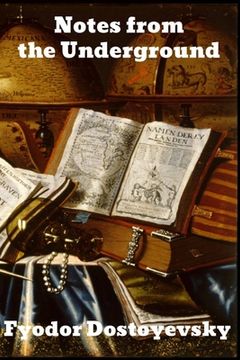Compartir
Notes from the Underground (en Inglés)
Fyodor Dostoyevsky
(Autor)
·
Binker North
· Tapa Blanda
Notes from the Underground (en Inglés) - Dostoyevsky, Fyodor
$ 23.050
$ 38.410
Ahorras: $ 15.360
Elige la lista en la que quieres agregar tu producto o crea una nueva lista
✓ Producto agregado correctamente a la lista de deseos.
Ir a Mis Listas
Origen: Estados Unidos
(Costos de importación incluídos en el precio)
Se enviará desde nuestra bodega entre el
Jueves 27 de Junio y el
Martes 09 de Julio.
Lo recibirás en cualquier lugar de Chile entre 1 y 3 días hábiles luego del envío.
Reseña del libro "Notes from the Underground (en Inglés)"
Notes from Underground, also translated as Notes from the Underground or Letters from the Underworld, is an 1864 novella by Fyodor Dostoevsky. Notes is considered by many to be one of the first existentialist novels. It presents itself as an excerpt from the rambling memoirs of a bitter, isolated, unnamed narrator (generally referred to by critics as the Underground Man), who is a retired civil servant living in St. Petersburg. The first part of the story is told in monologue form, or the underground man's diary, and attacks emerging Western philosophy, especially Nikolay Chernyshevsky's What Is to Be Done?[2] The second part of the book is called "Apropos of the Wet Snow" and describes certain events that appear to be destroying and sometimes renewing the underground man, who acts as a first person, unreliable narrator and anti-hero.Serving as an introduction into the perplexing mind of the narrator, this part is split into nine chapters. The introduction to the chapters propounds a number of riddles whose meanings are further developed as the narration continues. Chapters 2, 3 and 4 deal with suffering and the irrational pleasure of suffering. Chapters 5 and 6 discuss the moral and intellectual fluctuation the narrator feels along with his conscious insecurities regarding "inertia"--inaction. Chapters 7, 8 and 9 cover theories of reason and logic, closing with the last two chapters as a summary and transition into Part 2.The narrator's desire for unhappiness is exemplified by his liver pain and toothache. The narrator mentions that utopian society removes suffering and pain, but man desires both things and needs them to be happy. According to the narrator, removing pain and suffering in society takes away a man's freedom. This parallels Raskolnikov's behavior in Dostoevsky's later novel, Crime and Punishment. He says that the cruelty of society makes human beings moan about pain only to spread their suffering to others. He builds up his own paranoia to the point that he is incapable of looking his co-workers in the eye.The main issue for the Underground Man is that he has reached a point of ennui and inactivity.
- 0% (0)
- 0% (0)
- 0% (0)
- 0% (0)
- 0% (0)
Todos los libros de nuestro catálogo son Originales.
El libro está escrito en Inglés.
La encuadernación de esta edición es Tapa Blanda.
✓ Producto agregado correctamente al carro, Ir a Pagar.

